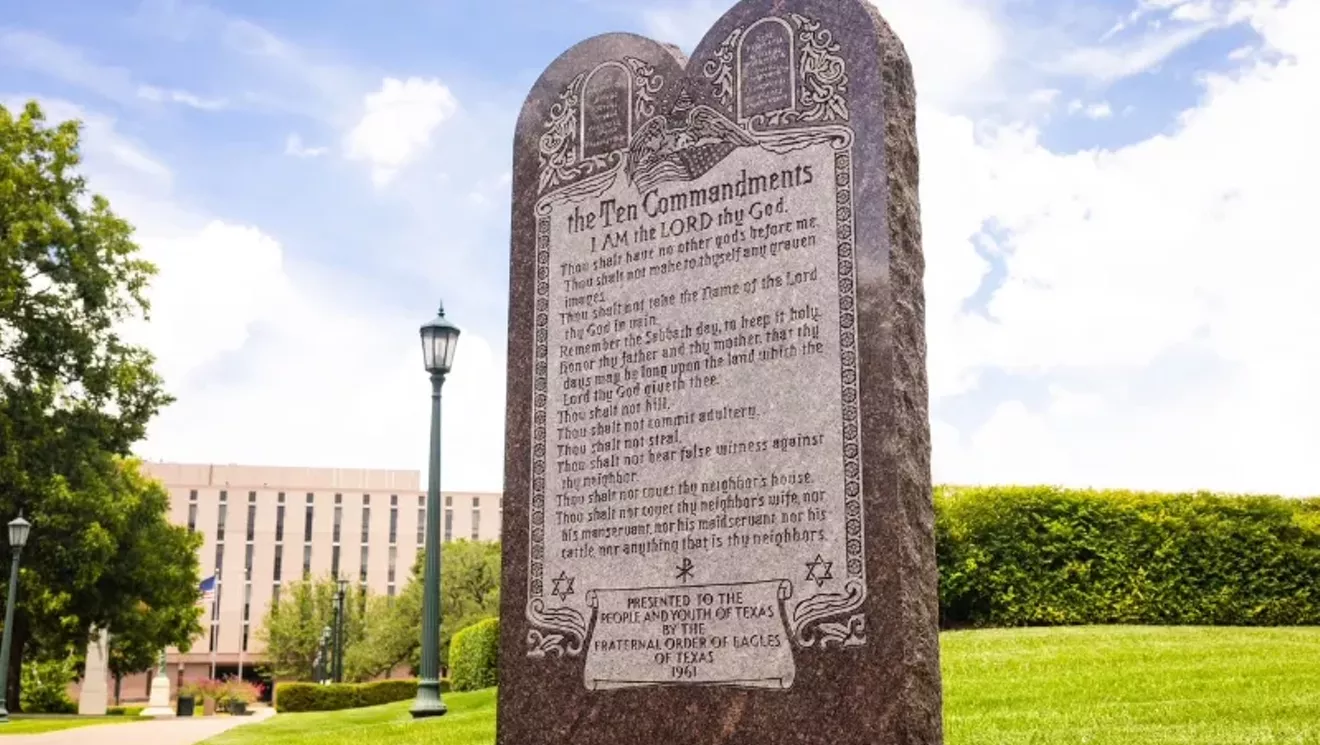Another Lawsuit Filed to Challenge Ten Commandments Mandate in Texas Public Schools

When the Texas Legislature approved Senate Bill 10, requiring that the Ten Commandments be displayed in every public school classroom, government watchdogs predicted there would be legal action. They were right.
A second lawsuit claiming that SB 10 is a “clear violation of students’ and families’ religious freedom and the separation of church and state” was filed in federal court on Monday by 15 multifaith and nonreligious Texas families.
The plaintiffs plan to file a motion for a temporary restraining order and a preliminary injunction, asking the court to require 14 defendant school districts, including Conroe ISD, to remove any Ten Commandments displays currently posted and to refrain from hanging new displays pending the resolution of the litigation.
This week’s legal action comes on the heels of a lawsuit filed in August, Rabbi Nathan v. Alamo Heights Independent School District, in which U.S. District Judge Fred Biery issued a preliminary injunction saying the 11 districts named as defendants in that suit didn’t have to follow Senate Bill 10.
Texas Attorney General Ken Paxton immediately appealed what he deemed a “flawed ruling” in the Rabbi Nathan suit and said Austin and Houston ISDs had to follow the state law even though they were named as defendants in the lawsuit. Cypress-Fairbanks and Fort Bend ISDs were also named in the original lawsuit.
SB 10, authored by Sen. Phil King, R-Weatherford, requires that the scripture be displayed on a donated 16-by-20 poster. “While no school is compelled to purchase Ten Commandments displays, schools may choose to do so,” Paxton said in a statement after he challenged the first lawsuit. “However, schools must accept and display any privately donated posters or copies that meet the requirements of SB 10.”
The 5th U.S. Circuit Court of Appeals deemed Ten Commandments displays in public schools “plainly unconstitutional” days before the Texas legislation was signed into law.
In the latest legal action, Cribbs Ringer v. Comal Independent School District, the school districts named as defendants include Comal, Georgetown, Conroe, Flour Bluff, Fort Worth, Arlington, McKinney, Frisco, Northwest, Azle, Rockwall, Lovejoy, Mansfield, and McAllen ISDs.
The plaintiffs in both cases are represented by the American Civil Liberties Union of Texas, the ACLU, Americans United for Separation of Church and State, and the Freedom From Religion Foundation, with Simpson Thacher & Bartlett LLP serving as pro bono counsel.
Plaintiff Kristin Klade, a Lutheran pastor, said in a statement that she is a devout Christian and believes that the “spiritual formation of my children” is a privilege she takes more seriously than anything else.
“The mandated Ten Commandments displayed in my children’s public school impedes my ability to ‘train up my child in the way he should go’ (Proverbs 22:6),” Klade wrote. “I address questions about God and faith with great care, and I emphatically reject the notion that the state would do this for me.”
Other plaintiffs said the Texas law forces religion on children and is a calculated step to erode the separation of church and state. Following the Rabbi Nathan ruling, attorneys in the case sent a letter to all Texas school districts suggesting they not implement SB 10 because it would violate the First Amendment.
“Even though your district is not a party to the ongoing lawsuit, all school districts have an independent obligation to respect students’ and families’ constitutional rights. Because the U.S. Constitution supersedes state law, public-school officials may not comply with SB 10,” the letter states.
Supporters of the legislation say the Ten Commandments and Christian teachings are vital to understanding U.S. history.
Some districts have gotten creative in how they follow the law. Hays Consolidated ISD near Austin accepted donated Ten Commandments posters from the nonprofit My Faith Votes/Million Voices and opted to also display the Bill of Rights, which states that, “Congress shall make no law respecting an establishment of religion.”
“We know that posting the Ten Commandments will spark many campus and community discussions,” said Hays ISD Superintendent Eric Wright in a statement.”We think it’s entirely appropriate to also display the other document that will be frequently cited in those conversations and in the legal process. The district won’t defy state law, but we can approach this new mandate as a learning opportunity,”
ACLU of Texas attorney Chloe Kempf said in a press release this week that Texas families from religious and nonreligious backgrounds are “once again coming together to challenge this blatantly unconstitutional law.”
“This lawsuit is a continuation of our work to defend the First Amendment and ensure that government officials stay out of personal family decisions,” she said. “All students — regardless of their race or religious background — should feel accepted and free to be themselves in Texas public schools.”

Reign Bowers is an outdoor enthusiast, adventure seeker, and storyteller passionate about exploring nature’s wonders. As the creator of SuperheroineLinks.com, Reign shares inspiring stories, practical tips, and expert insights to empower others—especially women—to embrace the great outdoors with confidence.




Post Comment